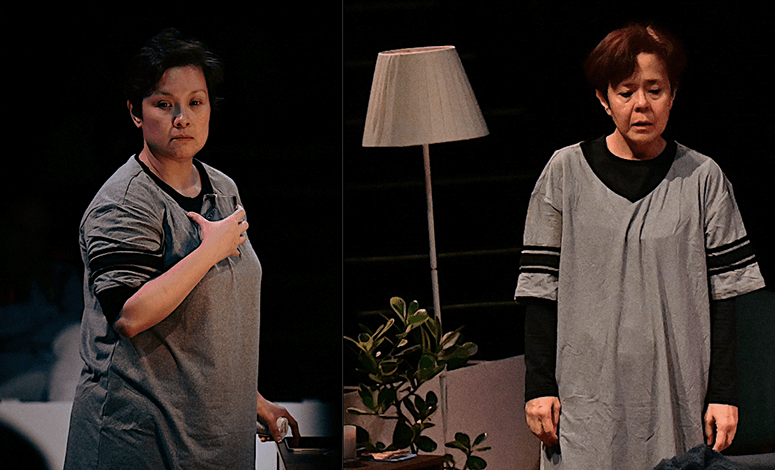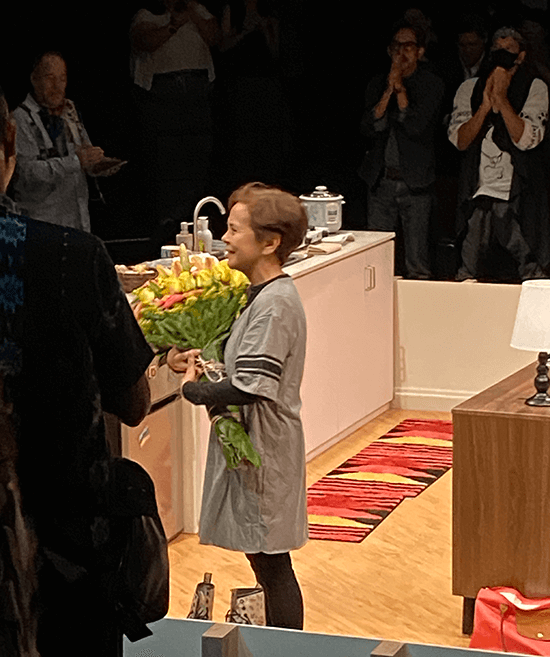Shh! These two powerhouse actors are in a quiet place
In a feat of dream casting, producers Clint Ramos, Bobby Garcia and Chris Mohnani of the Samsung Performing Arts Theater brought together two acting powerhouses for a one-act play in which not much—on the surface—happens at all.
Adapted from German playwright’s Franz Xaver Croetz’s 1970s play Wunschkonzert (Request Program), the Filipino version Request sa Radyo moves the action to a modern OFW’s cubicle-like apartment in NYC’s frigid winter days, played out on a carefully detailed yet simple stage. Tony and Olivier award winner Lea Salonga and Golden Globe and BAFTA nominee Dolly De Leon play the same woman character in alternate shows, locked in a quotidian hour of repetitions and stage business.
“Action” is a relative term here. Watching Request sa Radyo on a preview night, with Salonga and De Leon giving back-to-back performances for the one-hour play, is akin to watching performance art. (Think Tilda Swinton sitting in a glass box for six hours at MoMA.) It’s a portrait of isolation, seen through the OFW perspective, without a single word spoken, though we in the audience become unwitting accomplices, like listeners to John Cage’s 4’33, in which the pianist sits motionless, allowing the ambient sound of a restless audience to “become” the piece. I felt the strangest sensation, shifting my gaze from Dolly’s reserved actions to the audience members’ puzzling faces: in a sense, she was the only “alive” person in the room, acting out a version that existed in her head, in her motions, while we were mere spectators of this “life,” such as it is.

Watching De Leon enter the apartment from (evidently) a hospital job, remove her outer layers and settle into a night of pretty un-stimulating activities (one highlight involves working on her Magic Marker coloring project) as a local radio station softly plays its allotted hour of Filipino song requests in the background, you are drawn in to the life of so many OFWs abroad, or indeed, anyone living alone, feeling the tug of loneliness.
In the hands of De Leon, the piece becomes a meticulous series of routines that offer up a dull, deadly drumbeat—or the sound of a hamster relentlessly running its paces in a silent wheel, only later glimpsing the rigid confines of its setup.

We study her face as the microwave oven prepares her leftovers in a plastic container: flickers of concern, some far-off memory. Then the ding of the microwave bell stirs her awake.
Crotetz’s original play may have addressed a different species of urban loneliness at the time, but it translates well into a contemporary take on OFW life.

While we only caught De Leon’s performance, viewers later contrasted the two versions: Salonga voluntarily shed her well-known Broadway chops to pull off a dramatic take. Sandbox Collective’s Toff de Venecia found it took some time to “defamilarize” himself from Lea’s persona, and celebrity, in order to settle into her interpretation. Others said Salonga adopted a more overt display of the drudgery of her life: she showed how it weighed down on her through her body and expressions; whereas Dolly relied on a stark succession of motions, repetitions, that felt all the more crushing.

While De Leon seemed to capture this sense of deadened utility—the single cup of rice emptied into a (fully functional) rice cooker and prepared onstage, the single placemat and the careful screwing and unscrewing of ice tea bottle caps—it could also pass as the self-sacrifices that OFWs make for some far-away recipient of their efforts. In that way, it reminded me of so many Filipino aunts I’ve known in New York or California who’ve taken on the careful details of careful living, saving money to benefit others back home.
Yet this self-sacrifice—which is so central, in my experience, to OFW life—is hard to parse in Request sa Radyo. We don’t know who Dolly/Lea is doing all of this for. We see no glimpse of a family or loved ones in the “homeland” that a solitary radio announcer mentions between Pinoy pop song requests.
That’s probably intentional, as Kroetz’s original play is sparse in back story, though rich in details—the kind that actors can go to town with.
Thankfully, the play allows a few moments of levity—or silent comedy, as it were.
When a romping Pinoy rock number from the ‘80s emerges from the radyo, Dolly’s character pauses from her room-cleaning activities to lip-sync and pump her fist like she’s at Club Dredd. At other times, there’s business about shooting the right angle of her coloring book creation with her cellphone camera.
But there’s much about the dark hour of the soul as well, when the lights go out on Dolly/Lea’s boxlike world.
Outside, after the gripping back-to-back shows, we gathered for cocktails, and Lea and Dolly ascended the elevator of Samsung Performing Arts Theater clutching their beds of roses and amiably chatting with oh-so-many fans. They had seemingly shed the restricting intensity, and were back among… the living, the grateful, the happy-yet-subtly-altered audience members, cameras already poised and ready.
* * *
Request sa Radyo, produced by Clint Ramos, director Bobby Garcia and Christopher Mohnani for Ayala Land, has a strictly limited engagement of 20 performances until Oct. 20 at the Samsung Performing Arts Theater, Makati City. Lea Salonga and Dolly De Leon perform the solo piece in scheduled alternating performances. For tickets, visit https://premier.ticketworld.com.ph.


